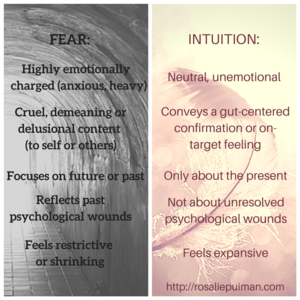At the very end of our almost 2.5-hour deep coaching conversation, my client asked me this: "How do I know when to trust my intuition and when to disregard it?"
She'd had several situations where she'd had a negative gut feeling about a situation, ignored it and later found that ignoring the feeling was the best thing she could have done.
Basically she wondered: Why would I trust my intuition when it's so often wrong?
Now that's an interesting question, because I believe intuition is never wrong. So what was going on here?
Suddenly I realized the problem: She wasn't experiencing intuition, but fear.
And then, obviously, she asked me: "But if that's true, how do I know when my gut feeling is fear and when it's intuition?"
Yep. Great question.
Even though I know how I distinguish between fear and intuition, I didn't have a set of concrete tips handy to offer her in the few minutes that we had left.
So I owe her an answer, and because I guess she and I may not be the only ones who are not absolutely sure how to distinguish a gut feeling based in fear, from a gut feeling based in intuition, I decided to write about it here.
What is Intuition?
Let's first start with the basics. "Intuition" is such a buzzword that almost everyone has their own personal definition of what intuition is.
I did some research online, and found this straightforward definition:
"Intuition is the ability to understand something instinctively, without the need for conscious reasoning."
And I think this is partly true, but intuition is more then just instinctive. There's more to it then the instinctive urge to run from danger or to have food and water.
Even though I agree that intuition doesn't need conscious reasoning, I believe it is not without cognitive elements. It's more consideration than reasoning though. Intuition uses past knowledge and experiences to assess a situation, as well as a very quick assessment of the present, based on clues and details that may not be obvious to the rational mind, but are definitely there.
My definition of intuition is:
Intuition is a subconscious assessment of various elements:
leading to a calculation of the best way to handle a situation.
- the past (e.g. experiences, knowledge),
- personal needs and preferences (e.g. how do I want to feel) and
- the present (e.g. feelings that arise, choice of words, surroundings and signs other people are giving),
I basically see intuition as a knowing that is based on more, rather then different elements than the rational mind can deal with at one given moment.
Is it Fear or Intuition?
Fear and intuition are easily confused, and that has to do with the fact that they are both experienced as a "gut feeling" -- and I mean that literally: a feeling in your gut area.
Many of us have fallen a little out of touch with our gut feelings, to put it mildly. We're so occupied with our thoughts and intelligent reasoning, that it's hard to understand what our gut means when it has a feeling.
There are ways to distinguish gut feelings based in fear from gut feelings that signal intuition. Here's how:
The difference between Fear and Intuition
The two most important things that separate fear from intuition are
1) Intuition being only about the present. There's NO worrying about past or future involved.
2) Intuition being neutral, unemotional, whereas fear is highly emotionally charged.
Reliable intuition feels right, it has a compassionate, affirming tone to it.
It confirms that you are on target, without having an overly positive or negative feel to it.
Fear is often anxious, dark or heavy. It has cruel, demeaning or delusional content (to yourself or to others) and it reflects unhealed psychological wounds.
How to distinguish Fear from Intuition
I have two practices to learn how to distinguish fear from intuition.
The first one is a little heavy, but very helpful: Make a list of everything you are afraid off. After that, it will be easier to recognize when a gut feeling is referring to one of your fears.
The second practice is from Christine Gutierrez:
Imagine a baby or pet you love -- try to get a clear image in your head -- and notice the feeling in your belly that goes with this picture. It will be expansive.
Then, imagine a destructive image, like failing to get your dream job, gaining lots of kilos or whatever gets you upset. Notice the feeling: it will be restrictive, shrinking.
Lastly, imagine a fearful feeling based on intuitive guidance, e.g. going to see a therapist to deal with the destructive feeling you just thought of, even though you've always been afraid to go into therapy.
Close your eyes, and experience BOTH the fear AND the underlying good feeling that indicates you know you are doing the right thing.
Practice feeling the difference between Fear and Intuition
It's extremely powerful, and very handy, to know how to separate the gut feeling that you can (and should) trust immediately (intuition) from the one you should look at in compassion (fear). Getting to know the difference between fear and intuition takes practice and it is absolutely worth the effort.
On a side note: Fearful feelings can be interfering, but they are not all without use. Sometimes fear signals that moment just before you start something new. In that case, a gut feeling based in fear can be a signal for you to push on.
I would love to hear your thoughts on the topic of fear and intuition. Take a moment to add your voice to the discussion in the comments below.
After reading this you may want to connect to yourself and learn to recognize your gut feelings. My free 30 Day Self Love Challenge could be a great way to get that started.
